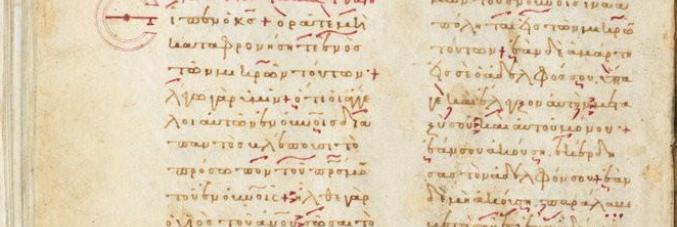
Ciclo di seminari | Storie di testi. Seminari di Filologia classica - Secondo semestre 2024-25
Il programma per il secondo semestre a.a.2024/25 prevede i seguenti seminari:
Martedì 18 febbraio 2025, ore 15.00
Sala Bortolami, Palazzo Jonoch Gulinelli
Scienza e Neoplatonismo: ricerche e sviluppi
Dalla meteorologia all’alchimia: Olimpiodoro, Anassimandro e il «principio intermedio» (metaxu)
Cristina Viano (CNRS-Centre Léon Robin, Paris)
Les structures numériques des ordres divins dans la «Théologie Platonicienne» de Proclus
Philippe Hoffmann (EPHE, Paris)
Ovochrysopoeia tra Bisanzio e Baghdad: testi e pratiche
Matteo Martelli (Università di Bologna)
Martedì 25 febbraio 2025, ore 11.00
Aula Diano, Palazzo Liviano
A new edition of Ps.-Aristotle's Magna Moralia. Reflections on its text and manuscript tradition
Christian Brockmann & José Maksimczuk (Univ. Hamburg - Centre for the Study of Manuscript Cultures)
Giovedì 27 febbraio 2025, ore 9.00
Aula Diano
Disentangling complex traditions. Reflections on the textual and material transmission of Aristotle's Organon
José Maksimczuk (Univ. Hamburg - Centre for the Study of Manuscript Cultures)
Mercoledì 23 aprile 2025, ore 14.30
Aula Diano
Graeco-Arabic Lexicography
What is it about? ― What can it contribute to traditional Greek, Byzantine and Arabic lexicography? ― How can editors of ancient Greek or medieval Arabic philosophical and scientific texts benefit from it?
Rüdiger Arnzen (Ruhr-Universität Bochum)
Abstract:
Graeco-Arabic lexicography studies the language of ancient and early Byzantine Greek texts and their medieval Arabic translations. Its methods and products differ fundamentally from those of bilingual dictionaries, no matter what pair of (source- and target‑)languages is concerned.
The present talk will:
- explain the theoretical and methodological peculiarities of Graeco-Arabic lexicography as compared with other types of historical lexicography, modern bilingual lexicography or reference dictionaries, including a brief overview of the state of the art
- address the question if and how Graeco-Arabic lexicography can contribute to our knowledge of both ancient and early Byzantine Greek as well as medieval Arabic
- illustrate with a couple of examples how editors of ancient Greek or medieval Arabic philosophical and scientific texts may benefit from Graeco-Arabic lexicography.





